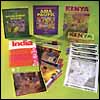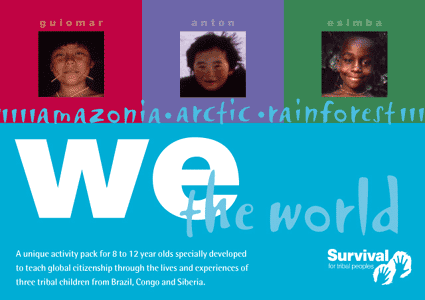There is also a 'Talkboard' to enable pupils to find out more from an 'expert' in the field, and write in their own views. In addition, there is a 'Glossary' to help pupils get to grips with some of the more technical language included on the web pages. � With this edition, a new character, Jack the Parrot, joins Harry and Cecile on their travels around the website, answering their questions and challenging pupils to think about a variety of development issues.� SKILLS COVERED BY THIS EDITION�
�EXTRA INFORMATION AND RESOURCES SUGGESTIONS
Worldaware's primary resources catalogue is available online in pdf format on the Worldaware website, www.worldaware.org.uk or you can request a printed copy by phone (020 7831 3844) or e mail ([email protected]). The latest catalogue offers a diverse selection of resources across a range of curriculum areas, drawing together recommended materials from a number of different organisations and publishers.� 1.Eye On The GambiaThe web pages on the Gambia are divided up into:� The Land, Climate, People, Work & Industry, Wiltshire World Studies Centre produces a range of resources on The Gambia, including: Isatou, Chloe & You - A pack that compares the lives of three children: Isatou who lives in The Gambia, Chloe who lives in Britain and the child using the pack. Includes background notes, 24 colour photographs, activity ideas and an audiotape. �25. Available from Worldaware (Code PA 208). Isatou, Chloe & You - A 43 minute video which supports the pack described above. The video has no soundtrack, but a written commentary is provided on paper. �10. Available from Worldaware (Code V4). Introducing The Gambia - Background information for teachers on the environment, people and the economy. �7.50. Available from Wiltshire World Studies Centre, 1a London Rd, Marlborough, Wilts, SN8 3SW. Tel 01672 516070, Fax 01672 514922, e-mail [email protected] �Websites: www.odci.gov/cia/publications/factbook provides more country information on the Gambia.� 2.Focus on TourismThe pages in this section include many interactive features to develop children's knowledge about the interdependence of people and places, encouraging observational and questioning skills through the study of tourism. This topic would provide a theme through which to cover QCA Units 18 to 24. � Beginning with an overview of the tourist industry and its increasing importance for Less Economically Developed Countries, and moving on to case studies in Bali, Kenya and Belize, it puts forward contrasting facts and ideas for and against the development of tourism. �A variety of materials are available on tourism from Tourism Concern, including:� P Mason, Learn to travel: Activities on Travel & Tourism for Primary Schools: Teacher's resource book of ideas & lesson plans with emphasis on care for the environment & sensitivity to other cultures (WWF 1992) �9.95. Primary Teacher's Pack: A collection of resources, case study sheets & activities (Tourism Concern 1997) �6.50. Looking beyond the brochure A 20 minute Video & pack containing 120 pages of photocopiable materials (Tourism Concern 1999) �20. Looking at Tourism A Photopack with 40 b/w A4 photos plus teacher's notes on how to use them. Useful for group discussion & display. (Arbeitskreis T & D 1995) �14.00 To order any of the above, contact Tourism Concern, Stapleton House, 277-281 Holloway Road, London N7 8HN. Tel: 0207 753 3330 or e mail: [email protected]� Questioning Tourism A 12 page loose leaf folder aimed at KS2 or 3, using students' experiences both as hosts and holiday makers, and looking at the costs and benefits to developing countries. (Commonweath Institute/Focus for Change, 1993) �4.00 + P+P. Available from Oxfam Education, 274 Banbury Road, Oxford OX2 7DZ. Tel: 01865 311311. Websites (for teachers)� www.oneworld.org/guides/tourism www.tourismconcern.org.uk www.panda.org � Sally Morgan: Living for the Future: Tourism in the Balance Offers an excellent introduction to the problems caused by tourism and the need for a change in the way we view our holidays. Centred on tourism and Agenda 21, it looks at alternatives that would allow visits and benefits for the host countries, conserving wildlife and special habitats. Designed for KS 2 & 3 �10.99 Franklin Watts Publishers 1998, 96, Leonard Street, London EC2A 4RH. � R Corlett: Sacha Mama (Mother Jungle) 15.25 A pack on ecotourism in the Amazon rainforest, with activity sheets, teacher information & 10 A4 colour photos on the development of tourism in Napo, Ecuador (Action Aid, 1996) �15.25 Available from Tourism Concern.� Websites for teachers giving a background to sustainable tourism: www.ecotourism.about.com/ BaliUNICEF: Salamat Datang A pack including a set of photos & a poster on life in Indonesia, including activities on tourism (UNICEF 1996) �3 Available from Tourism Concern. M Kirby: The Water Kit A KS 2 cross curricular pack of photocopiable activities including questions on the use of water (Water Aid & Pearson Publishers) �16. Available from Worldaware (Code PA 202). KenyaFeeling Good about Far-away Friends An innovative resource that uses participatory activities to help pupils explore their own lives in comparison with a Maasai family in Kenya.(1995) Available from Leeds Development Education Centre, 153 Cardigan Road, Leeds LS6 1LJ, Tel: 0113 278 4030. Belize The Belize Zoo and Tropical Education Centre runs a schools outreach programme and will be able to put you in touch with a school in Belize. You can contact them at the Schools Outreach Programme, PO Box 474, Belize City, Belize, South America � Coral Reefs www.coral.org www.seaworld.org/coral_reefs/introcr www.nhptv.org/kn/itv/coral Websites for pupils www.yoto98.noaa.gov/kids 3.On Camera: How to be a Better Tourist From the use of photographs, children are encouraged to take some responsibility for the effects of tourism and think about ways to promote sustainable tourism. Although linked to overseas destinations, the questions could easily refer to localities in the UK. This section also provides useful background material for the main competition. � 4.ActionThis edition focuses on the work of Paul Edwards, a Year 6 teacher at Shakespeare Junior School, Southampton and their use of the We, the World pack edited by Elizabeth Gilbert, published by Survival International. The pack consists of an A1 size poster of the world with insets on eight tribal peoples. Three of these are featured in A3 size posters with beautiful photographs. As a means of engaging with the tribal children a sequence of mock letters is provided for each. National Lottery and commercial partnership has permitted this pack to be distributed widely and Worldaware can provide copies for just �2.50 for the postage. You can contact Survival International directly at 11-15, Emerald Street, London WC1N 3QL, Tel 020 7242, Fax 020 7242 1771 or e mail <[email protected]>
"Our Year 6 children study the rainforest as a Geography unit. I felt that they needed to know more than the bare facts of rainforest botany and physical geography. Certainly it is important to know how beautiful and diverse the rainforest is but I wanted to bring the forest alive for them in a real sense through contact with people of their own age actually living there, and with its problems and imminent dangers. Through contact with Survival International at university, I personally became aware of the plight of indigenous people and was very keen to get this message across to the next generation. I felt the 'We, the World' pack was a perfect vehicle for this as it centres on real children of a similar age. The children loved reading the penpal letters from Esimba and Guiomar, and were thrilled to be able to learn the Bakka hunting signals. The pack enables children in a very far-off western society to really empathise with, and understand better the lives and problems of rainforest peoples". In order to share your ideas and experience with a much wider audience, would you like your school or class to feature in a future edition of Global Eye Primary? We would be keen to hear from any teachers who have been raising development awareness amongst their pupils in an original, interesting way, whether as part of the curriculum or via links that you may have with developing countries. Here is a chance to have your hard work shared with others and to spread good practice. Please contact the editor, [email protected] 5.CompetitionsCompetition 1 gives an opportunity to test reading skills and recall of information. Hopefully the children will find it to be fun! Competition 2 enables children to practise their creative skills through designing a tourist poster for The Gambia, using information from the Eye On section. To encourage children to work together, plan, organise and present a report, Competition 3 involves the development of a new tourist resort. Using information included on the website, and encouraging further research, children are asked to plan a new resort that takes into account sustainable development for all the resort's visitors. Please encourage your pupils to take part! We have prizes available, and hope that the May 25th closing date for entries gives you sufficient time to plan one or all of these exercises into your curriculum plan. In order to submit entries for Competitions 2 & 3, please ensure that the pupils' efforts are sent to us with a completed entry form. Copies of this can be printed out from the Competitions section of the website. The Global Eye Primary website, Spring 2001 was written by Simon Scoones and Pat Trussell. Contributions and assistance from: Tourism Concern, Survival International and Paul Edwards of Shakespeare Junior School, Southampton. Photographs: Panos Pictures, Still Pictures, Paul Edwards, Worldaware. The Global Eye website is a resource for both primary and secondary school students about world development. It is produced each term by Worldaware for the Department for International Development (DFID). Worldaware
E Mail (General Enquiry): [email protected] ��
|
�




 �
�